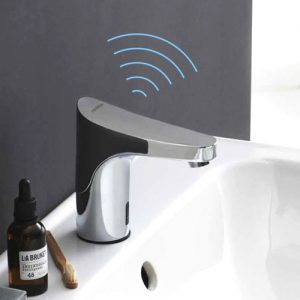
 Introduction
Introduction
Ensuring the safety of patients and staff in healthcare facilities is an ongoing commitment, leading to recent recommendations were applicable on the removal of Thermostatic Mixing Valve (TMV) valves. The Health and Safety Guidance 274 (HSG 274) underlines the importance of innovative solutions that not only adhere to safety standards but also address practical challenges related to TMV maintenance, scalding risks, and potential waterborne diseases. In this context, the groundbreaking WMS Tronic taps stand out with their dual anti-scald capability, offering a comprehensive and innovative safety solution not involving a TMV valve, which has up till now not been available to the market.
Recommendation: Comprehensive Risk Assessment Before TMV Removal
Before the removal of any TMV valves, a comprehensive risk assessment is crucial, considering the age and vulnerability of users. This aligns with HSG 274 guidelines, ensuring a nuanced understanding of potential risks and benefits, balancing the prevention of scalding incidents with the heightened threat of nosocomial waterborne diseases, such as legionella. At the same time it must be appreciated that the retention of a TMV valve does not in itself present a risk as long as it is appreciated that the stakeholder does have a responsibility to regularly maintain/service the units and confirm it is indeed performing within prescribed parameters.
Advantages of WMS Tronic Taps: Dual Anti-Scald Capability, Practical Safety, and Cost Efficiency
-
Incorporating TMV Directly in the Tap Fitting: WMS Tronic taps adhere to HSG 274
 recommendations by incorporating scald protection directly into tap fittings, ensuring precise temperature regulation at the point of outlet. This minimizes scalding incidents while streamlining the water system to reduce the potential for legionella or biofilm build-up.
recommendations by incorporating scald protection directly into tap fittings, ensuring precise temperature regulation at the point of outlet. This minimizes scalding incidents while streamlining the water system to reduce the potential for legionella or biofilm build-up. -
Reduced Maintenance Requirements: WMS Tronic taps significantly reduce maintenance requirements, thanks to their non TMV dual anti-scald capability. The innovative design not only enhances safety but also simplifies maintenance processes, eliminating the need for costly and time consuming maintenance by a competent person over a large hospital estate. Facilities managers can redirect these cost savings towards other critical areas, such as PPM or facility improvements.
-
Mitigating Legionella and Biofilm Risks: The simplified design of WMS Tronic taps reduces the complexity of water systems, mitigating the risks associated with legionella and biofilm build-up. This is particularly crucial in healthcare environments where water quality is a critical factor in ensuring patient and staff safety.
Dual Anti-Scald Capability: A Primary Safety Feature
The dual anti-scald capability of WMS Tronic taps emerges as a primary safety feature, addressing the core concerns of facilities managers and prioritising patient safety. This innovative capability  incorporates two layers of protection:
incorporates two layers of protection:
-
Mechanical Limiter on Temperature Control Lever: The mechanical limiter acts as a preventive measure, allowing facilities managers to set and limit the maximum temperature directly at the tap temp lever. This ensures that water delivered to the user is within a safe temperature range, reducing the risk of scalding incidents.
-
Electronic Sensor for Scald Detection and Cold Supply Interruption: The electronic sensor is a cutting-edge feature that detects scalding water or interruptions in the cold water supply. In response, it automatically cuts off the water supply, providing an additional layer of protection against scalding risks. This proactive approach not only enhances safety but also minimises the potential for waterborne diseases by ensuring hot water available at the very point of use.
Facilities Managers and Patient Safety: A Symbiotic Advantage
The dual anti-scald capability of WMS Tronic taps aligns facilities managers’ need for efficient maintenance and patient safety, creating a symbiotic advantage. Facilities managers benefit from reduced maintenance complexities, streamlined operations, and cost savings, while patients enjoy an added layer of protection against scalding incidents and waterborne diseases.
Extending Safety Beyond Standard Requirements
While compliance with safety standards is essential, the healthcare sector often strives to exceed the minimum requirements to ensure the highest level of patient and staff safety. WMS Tronic taps exemplify this commitment by offering features that extend safety beyond standard expectations.
-
User-Friendly Interface: The design of WMS Tronic taps incorporates a user-friendly interface, making them accessible to all users, including those with limited mobility. The ergonomic design of the temp handles and controls ensures that adjusting water temperature is intuitive and straightforward, reducing the risk of user error.
-
Remote Monitoring and Control: In the era of smart technologies, WMS Tronic taps provide an additional layer of convenience and safety through remote monitoring and control capabilities. Healthcare facilities can remotely monitor water usage, temperature settings, and potential issues, allowing for proactive maintenance and swift responses to emerging concerns.
Conclusion
The recent recommendations for the removal of TMV valves in healthcare applications represent a forward-thinking approach to safety in healthcare environments. As healthcare facilities adapt to these changes, solutions like WMS Tronic taps emerge as innovative alternatives that not only align with safety standards but also address practical challenges associated with TMV maintenance.
By incorporating anti scald functionality directly into tap fittings and simplifying the water system design, WMS Tronic taps offer precise temperature regulation and reduce the risk of legionella or biofilm build-up. The dual anti-scald protection mechanisms not only enhance safety but also significantly reduce maintenance requirements, presenting a cost-efficient solution for large hospital estates.
As healthcare facilities continue to prioritize the well-being of their patients and staff, adopting advanced technologies like WMS Tronic taps becomes not just a necessity but a strategic investment in creating a safer and more efficient healthcare environment. The integration of recent research findings, extended safety features, and practical considerations, including the necessity of a comprehensive risk assessment before TMV removal, positions these taps as a holistic solution that aligns with the evolving landscape of healthcare safety requirements.
